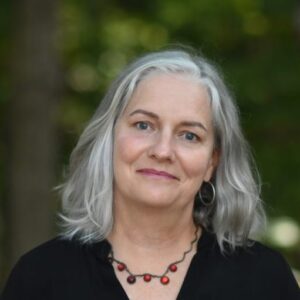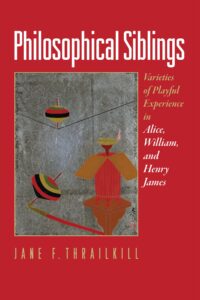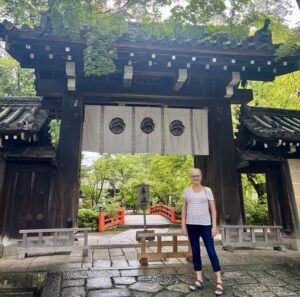Henry James, regarded as one of the most prolific writers of the English language, contributed much to the literary world with novels such as The Portrait of a Lady (1881), Bostinians (1886) and The Ambassadors (1903). His works often centered on children and toyed with elements such as realism and human consciousness. His older brother, William James, was equally accomplished in his own field: psychology. Known as ‘the father of American psychology’, James was a Harvard trained doctor who wrote The Principles of Psychology, an influential text that is relevant to this day.

However, it was their younger sibling, Alice James, a diarist, who was the “best of both worlds, with a keen insight into psychology and a fine insight into language” according to Dr. Jane Thrailkill. A professor of English and Comparative Literature, director of the Literature, Medicine, and English Graduate Program at UNC and co-director of the HHIVE Lab, is the newest president of the International Henry James Society and author of Philosophical Siblings: Varieties of Playful Experience in Alice,William, and Henry James (2022), which was recently shortlisted for the Christian Gauss Award presented by the Phi Beta Kappa society. The book centers on the very tight knit relationship of the siblings, which led to them having “collective childhood ideas about life and about how our minds work and about human relationships”.
 The siblings presented shared ideas in their own ways: Henry James through his works, William James through his psychological works and Alice through her diary, which is a fresh view, as the siblings have often been talked about either in pairs or individually, but never as a whole, until this book. However, they spoke “to different audiences: or, in the case of Alice’s diary, to no audience at all”, Professor Thrailkill writes. Alice suffered from physiological and psychological illnesses throughout her life, and as a woman in the 20th century, didn’t have the same opportunities her brothers had. Instead, she developed “immense friendships and wrote letters and kept journals” explained Dr. Thrailkill, who instead wrote in her diary, a common pastime for women in that age, a fact unknown to her brothers despite their close relationship which they only found out due to her death in 1892 at the age of 43. They were astonished at how brilliant their sister was, and at the detail and passion with what she wrote. However, due to various reasons such as a series of delays of a good publishing and her early demise, she was unable to gain recognition for her work.
The siblings presented shared ideas in their own ways: Henry James through his works, William James through his psychological works and Alice through her diary, which is a fresh view, as the siblings have often been talked about either in pairs or individually, but never as a whole, until this book. However, they spoke “to different audiences: or, in the case of Alice’s diary, to no audience at all”, Professor Thrailkill writes. Alice suffered from physiological and psychological illnesses throughout her life, and as a woman in the 20th century, didn’t have the same opportunities her brothers had. Instead, she developed “immense friendships and wrote letters and kept journals” explained Dr. Thrailkill, who instead wrote in her diary, a common pastime for women in that age, a fact unknown to her brothers despite their close relationship which they only found out due to her death in 1892 at the age of 43. They were astonished at how brilliant their sister was, and at the detail and passion with what she wrote. However, due to various reasons such as a series of delays of a good publishing and her early demise, she was unable to gain recognition for her work.
In recent times, however, the interest in the work of Henry and William James have directed researchers and fans to Alice, leading to books such as Philosophical Siblings. This work however, is a new way of literary criticism — instead of looking at authors as isolated beings having solely intellectual connections, Dr. Thrailkill looked at them as people who are influenced by their interconnected complex webs of relationships. “Imagine someone writing a biography about you, but leaving out your family, friends and other loved ones”, Dr. Thrailkill asked – “wouldn’t it feel incomplete?”
Dr. Thrailkill presented a paper on the communication between the siblings, Circulation and Digestion: The Corporeal Correspondence of Alice, William, and Henry James, at the three day 9th International Henry James Conference, held this past July in the city of Kyoto, Japan. Henry James, as an author, embodied the theme of being an international citizen in his works, as they often centered on the American experience in a history town.
Kyoto, an “amazing and beautiful” city which is a “sensory and aesthetic experience on its own”, which touched Dr. Thrailkill. The former capital of Japan, Kyoto, is filled with the contrast of historic sites and technological innovation. There, she was able to meet and connect with colleagues worldwide such as Professor Hitomi Nabae of the Kobe City University of Foreign Studies and others from countries such as South Africa, China, Poland, and Finland. In the end, Dr. Thrailkill’s work serves to remind us of the importance of considering the network of connections that envelop authors which are crucial to not just them but their work.
 Prasha Sheth is a biochemistry major at UNC. Born in Japan to two Indian immigrants, she spent the first 18 years of her life in Tokyo where she was exposed to different cultures and experiences. Prasha first got exposed to the intersection between health and humanities when she took a medical anthropology course her freshman year at UNC, which opened up a whole new avenue for her. She hopes to bring fresh perspectives to HHIVE and further her interest and understanding of the nuanced experiences in health settings.
Prasha Sheth is a biochemistry major at UNC. Born in Japan to two Indian immigrants, she spent the first 18 years of her life in Tokyo where she was exposed to different cultures and experiences. Prasha first got exposed to the intersection between health and humanities when she took a medical anthropology course her freshman year at UNC, which opened up a whole new avenue for her. She hopes to bring fresh perspectives to HHIVE and further her interest and understanding of the nuanced experiences in health settings.

